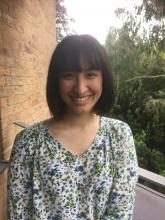Kerry McInerney (née Mackereth)
 Gates Cambridge International Scholarship
Gates Cambridge International Scholarship
Bodies at their limits: rethinking political violence through women’s hunger strikes
Supervisor: Professor Harald Wydra (Department of Politics and International Studies)
Abstract:
Hunger strikers operate in a liminal space between the active political subject and the passive “victim” of violence that underpin many theories of political violence. Through a feminist and anti-racist analysis of two women’s hunger strikes in the United Kingdom – the hunger strikes conducted by the British suffragette movement between 1909-1914 and the 2018 hunger strike at Yarl’s Wood Immigration Removal Centre (IRC) – this thesis makes three arguments regarding how women’s hunger strikes challenge conceptions of political violence centred around the liberal humanist subject and its victimised humanitarian “other”. First, in response to approaches that frame hunger strikes as a form of political speech, this thesis argues that gender and race shape how the pained body “speaks”. Second, it insists that an analysis of what hunger-striking body “says” must also include an interrogation of what the hunger striking body “does”. Consequently, this thesis examines the performative qualities of the hunger strikes in the suffragette movement and at Yarl’s Wood IRC, showing how the significance and the effects of these hunger strikes extended beyond their vernacular qualities. Third, this thesis argues that hunger strikes contain the potential to undermine the liberal humanist figure at the centre of theories of political violence. It contends that the suffragettes’ use of hunger strikes in the service of an imperialist political platform demonstrates how the hunger striking in and of itself does not necessarily disrupt this liberal humanist ideal. Nonetheless, it suggests that the Yarl’s Wood hunger strike shows how hunger striking can challenge the division between the liberal humanist subject and the humanitarian victim through relations of solidarity and interdependency. Together, these three arguments lay the foundations for rethinking certain precepts of political violence, in particular how political violence produces the human and its humanitarian others and how political protests resist this distinction.
Academic Background:
Bachelor of Arts (First Class) in Human, Social and Political Sciences at Corpus Christi College, University of Cambridge
MPhil (Distinction) in Multi-Disciplinary Gender Studies at Corpus Christi College, University of Cambridge
Publications
Mackereth, K. (forthcoming) “mechanical maids and family androids: racialised post-care imaginaries in Humans (2015-), Sleep Dealer (2008) and Her (2013)” Feminist Review, Special Issue on Digital Labour.
Research Interests:
Feminist and gender theory; critical race theory; embodiment; political violence; hunger; science fiction; the political imagination.
